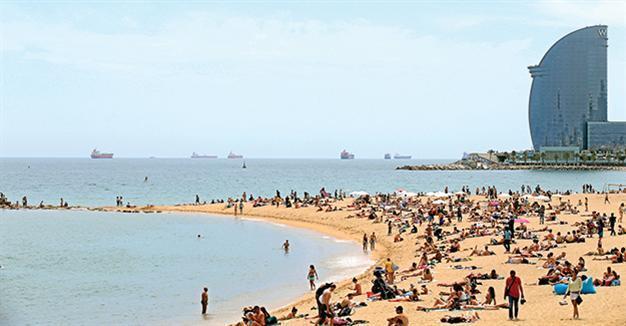Tourism boom fires Iberia as Turkey left in cold
BARCELONA - The Associated Press
 With sunny days getting longer and lazier, sparkling beaches warming up and terrorism fears driving customers away from other Mediterranean destinations, Spain and Portugal are reaping an economic bonanza from tourism.
With sunny days getting longer and lazier, sparkling beaches warming up and terrorism fears driving customers away from other Mediterranean destinations, Spain and Portugal are reaping an economic bonanza from tourism.While most in the cash-strapped nations are welcoming the influx, some locals have been exasperated by the crowds of tourists.
In the first two months of this year, the number of holidaymakers arriving in Spain was up more than 11 percent on the same period in 2015. Authorities predict that Spain is on course for its fourth straight record-breaking tourism year. ABTA, the United Kingdom’s largest travel association and Iberia’s main market, reports that bookings to Portugal are 29 percent up compared to last year, and are 26 percent higher for Spain.
That’s broadly seen as good news for the two Iberian economies, which nosedived during Europe’s recent financial crisis. But not everyone is cheering.
With the boom showing no signs of slowing and the summer vacation season approaching, some locals are fed up with throngs of tourists clogging the narrow streets of the peninsula’s centuries-old cities and crowding its celebrated beaches.
In Palma, capital of the popular Spanish island of Mallorca, graffiti in English appeared on city walls last month saying, “tourist you are the terrorist” and “tourist go home.” In Barcelona, complaints about overcrowding have grown so much that residents elected a mayor last year who is making good on promises to put a brake on new hotel construction and is exchanging ideas with New York City officials on how to cope with the crush.
Meanwhile, on the opposite coast, residents in the Portuguese capital of Lisbon grumble about packed sidewalks and heavy traffic.
Tourism analysts say security concerns are helping drive business toward the western Mediterranean areas and away from Europeans’ other traditional summer hotspots, especially Egypt, Tunisia and Turkey.
“The threats from terror have come into play,” says Rochelle Turner, director of research at the World Travel and Tourism Council in London, a forum for industry businesses.
Turkey’s visitor count in April was down nearly 30 percent compared to a year earlier, the tourism ministry said on May 27.
Spain, Europe’s most popular destination after France, hosted 68.1 million tourists last year - almost 5 percent up on the previous year - with the United Kingdom, France and Germany sending most visitors. The tourist trade brought in 67.4 billion euros ($75.3 billion) in 2015, the national statistics agency says.
In the first three months of this year, tourism created almost 89,000 new Spanish jobs. In a country with 20 percent unemployment, that’s a welcome development. But some say the surge has to be better managed.
“We cannot just keep growing at breakneck speed in terms of volume, filling or exceeding the capacity of some destinations,” Exceltur, a nonprofit group formed by the chairmen of the 25 leading Spanish tourist groups, has warned.
The people of Barcelona may agree. The Catalan capital of 1.6 million people received 4.2 million tourists in 2005. Last year, that number reached 7 million, triggering alarm.
“I’m all for a concept of sensible tourism ... but the truth is we have been invaded, and Barcelona’s own success is its own worst enemy,” said retiree Rosa Maria Miguel, 65, from the Barceloneta district - a historic fishermen’s quarter that nowadays boasts an exclusive marina for glamorous mega-yachts.
















